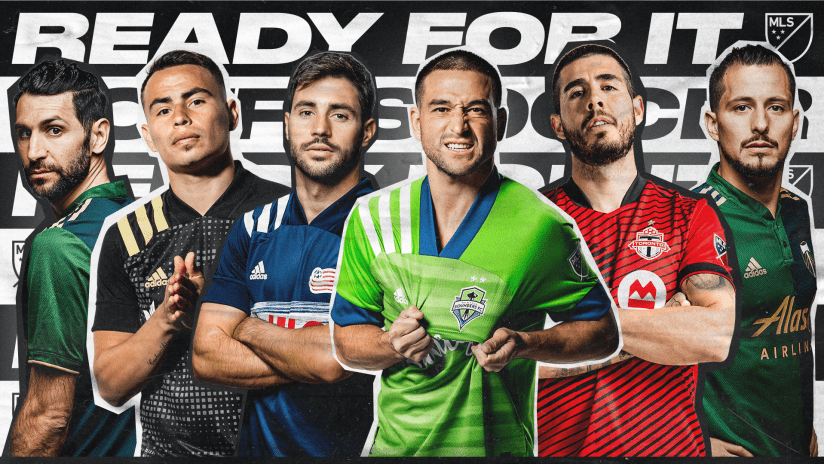Some have proclaimed the death of the traditional playmaker. A look around MLS tells a very different story.
“Until you bring a player, the No. 10 if you want, the playmaker, in a position where he can make the decision for a genius pass or not, so you have to play a few passes, you have channel balls, whatever. The counter-pressing makes it exactly the same – so you win the ball back high on the pitch and you are close to the goal, so it’s only one pass away from a really good opportunity most of the time. That’s why I said ‘No playmaker in the world can be as good as a good counter-pressing situation.’”
Jurgen Klopp uttered those words back in 2016, one year into his time in charge of Liverpool FC and two and a half seasons before he led the Reds to the UEFA Champions League trophy.
Though it’s certainly not a universal conclusion, the German manager’s distillation of his gegenpressing philosophy reflected a global trend that has only grown in the ensuing years. From Klopp’s “heavy metal football” to the “energy drink soccer” of the Red Bull network of clubs to the full-throttle pressing game of Marcelo Bielsa and his legions of apostles – including MLS-based spiritual heirs like San Jose’s Matias Almeyda and new D.C. United boss Hernan Losada – the idea of a collective approach trumping the old-school maestro has become a force to be reckoned with.
“The situation of the playmaker or No. 10 doesn’t really exist anymore and hasn’t done for a long time,” German national team manager Joachim Low said in 2018 as he explained the dwindling role of Mesut Ozil in his system.
Well, not quite.
MLS has become a prominent outlier on this front, even as a good chunk of its member clubs embrace pressing and counterpressing principles. That genre of “genius” playmaker Klopp referred to is alive and well in this league. Thriving, in fact.
Take a glance at the business end of last year’s Audi MLS Cup Playoffs bracket, or a list of recent MLS Cup finalists, and you’ll find plenty of game-changing No. 10s, most of them Designated Players. In fact, there’s a strong case to be made that not only is an elite attacking midfielder a good idea for teams with title ambitions, it’s practically mandatory.
Why? In a salary-budget league, impact 10s can be the proverbial rug that “really ties the room together” – force multipliers that can not only make big plays on their own, but also maximize the output of those around them. In modern MLS DPs are called upon to produce in decisive moments, and the most valuable are those that can pace an overarching tactical system as well.
The following are the best of the best as we enter the 2021 campaign: Maestros who lead top contenders and are destination viewing in their own right.
Nicolas Lodeiro, Seattle’s Mr. Everything
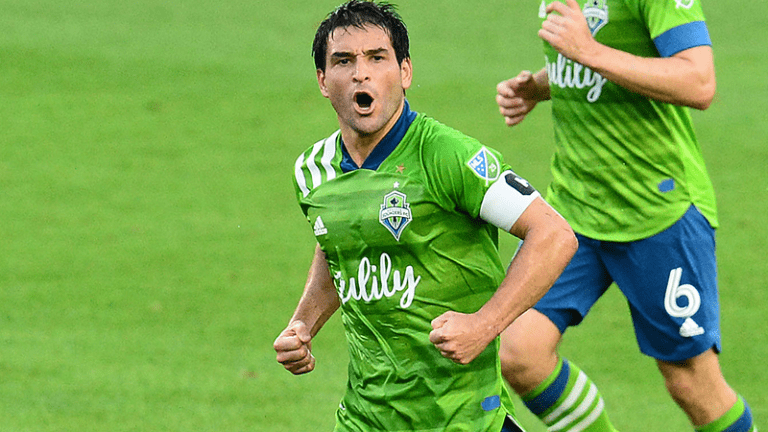
The Sounders’ Uruguayan ace is both workhorse and show pony, graced with brilliant vision and technique but also a relentless engine that routinely makes him his team’s most active and involved player on both sides of the ball.
He’s racked up 33 goals and 58 assists in 121 career MLS regular-season matches and 8g/10a in 21 playoff games. And as Armchair Analyst Matt Doyle wrote during last year’s postseason, Lodeiro is “the league leader in basically everything that screams ‘work rate’ — touches, touches per 90, usage rate, centrality and just simple distance covered. Lodeiro runs a lot, and running a lot if you're the No. 10 in a 4-2-3-1 that's designed to just be the structure built for you is an unambiguously good thing.”
Most importantly of all, his arrival on Puget Sound vaulted Seattle from consistent contenders to downright dynasty, in the form of two MLS Cup triumphs and two other trips to the cup final. In December the Rave Green inked him to a new contract that runs through 2023.
“For me, Lodeiro is the best No. 10 in the league for a couple years now, ever since he’s been here,” Real Salt Lake legend Kyle Beckerman said last year. “The guy is just a champion. Everywhere he goes – you check the stats and everywhere he’s gone he’s been a champion. It’s just amazing. This guy doesn’t stop running. Constantly. He’s pulling the strings for their team.”
Lucas Zelarayan, the capstone in Columbus
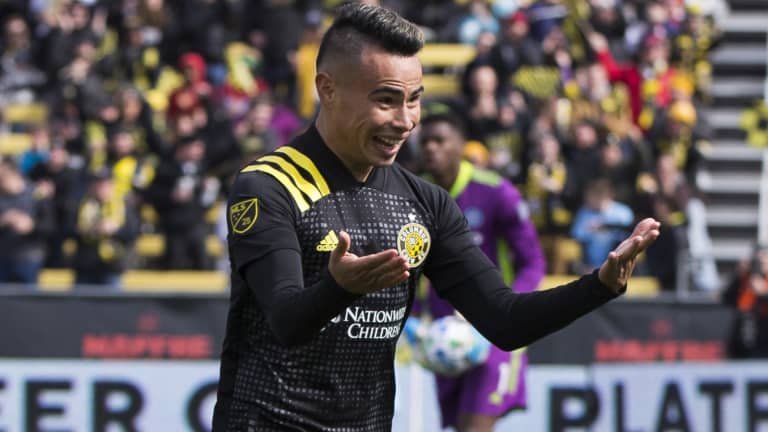
When Crew SC splashed out a reported $7-plus million to acquire “El Pirata” from Tigres UANL last winter, it didn’t just break the club’s transfer record, it smashed it – tripling their previous high fee and underlining the new intent of the previously frugal Ohio side. And questions were asked about the wisdom of the move, especially as it went hand in hand with the departure of club legend and incumbent No. 10 Federico Higuain.
A year later the decision was vindicated and then some as the Argentine dazzled in MLS Cup 2020, producing a man-of-the-match performance to put the defending champions from Seattle to the sword 3-0. Even with key starters Darlington Nagbe and Pedro Santos sidelined by COVID-19, the Crew were worthy winners as Zelarayan put his stamp on the occasion, running his 2020 output to 8g/3a across 20 combined regular-season and playoff matches.
With his passing range, sharp finishing, guile on the ball and capacity to press aggressively on the defensive side, the 28-year-old is the complete package, and enters 2021 as a firm MLS MVP contender.
“For our system to work, our game model to work, our philosophy to work, you need a No. 10 that’s going to move your team, run your attack, be that final-third player [with] production, but also fit our team defensively as well. It's not an easy position to find,” Columbus coach Caleb Porter said after their MLS Cup win.
“[But] honestly, it took five minutes watching this guy to go, ‘that's the guy.’”
Linking the Loons: Emanuel “Bebelo” Reynoso
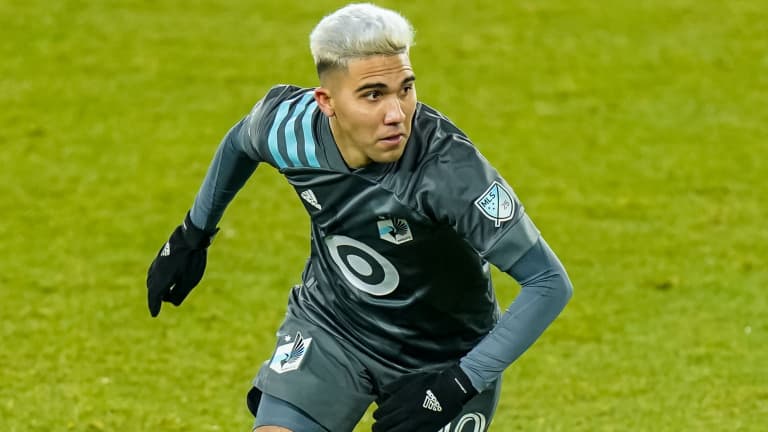
After enduring some real suffering in their first two seasons in MLS, Minnesota United hauled themselves onto a upward trajectory, qualifying for the 2019 postseason and then mounting a run to the semifinals of the MLS is Back Tournament last summer. A few weeks later they would punch the afterburners on that painstaking progress by completing their long-running pursuit of Bebelo.
Striding seamlessly from Boca Juniors to the Loons’ stretch run, “El Rey” found the scoresheet in his second MLS appearance and proceeded to reel off seven assists and one goal over the next 12 matches, powering MNUFC’s surge into the playoffs. Incredibly, he accelerated that pace in the postseason, dropping seven dimes across three matches – the first player in league history to notch multiple three-assist playoff games – plus a golazo of his own to take Minnesota to the cusp of MLS Cup before the Sounders’ late rally in the Western Conference final.
A fluid instigator in transition and a free-kick specialist par excellence, Reynoso reflects Argentina’s revered archetype of the diez, and with the physical capacity required to keep pace in MLS. At age 18 he took a gunshot wound to the leg when thieves robbed him of his motorbike, then recovered to make his first-team debut for Talleres de Cordoba mere months later, signs of a blue-collar sensibility much valued by Adrian Heath.
“Rey is not just really good with the ball. He’s really good without the ball,” the Loons’ coach said in September. “If you’re not prepared to play both sides of the ball, then you’re not going to play. That’s one of the things we saw in Rey when we watched him.
“We looked at the distance he covered during games. He’s very conscientious without the ball, which is huge for us. I know the two midfield players who play behind him will always be respectful of the amount of work he puts in.”
Alejandro Pozuelo, TFC’s talisman
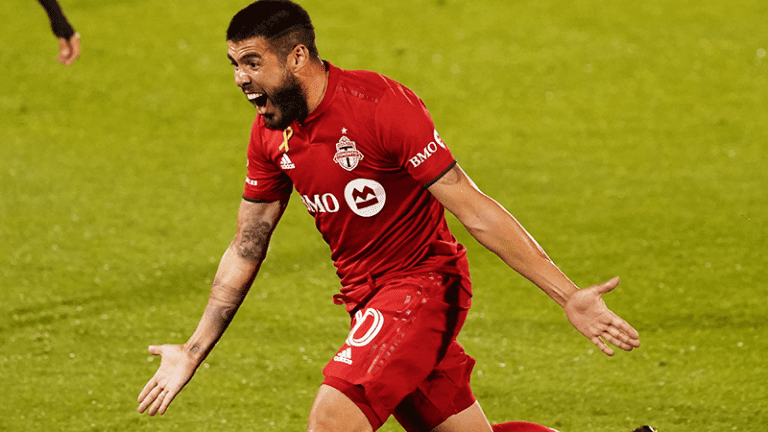
Toronto FC’s pursuit of Pozuelo, which veteran GM Ali Curtis called “by far the most complicated, time-consuming deal that I’ve ever worked on,” might be the only recent MLS transfer to rival Minnesota’s long courtship of Reynoso in terms of complexity.
Taking swift action after the sudden departures of DPs Sebastian Giovinco and Victor Vazquez following the 2018 season, Curtis and his staff identified the Spanish creator as the optimal reinforcement to keep the Reds at the top of the Eastern Conference. Though it required a total financial commitment well into the eight figures, Pozuelo was pried away from Belgian champions-in-waiting KRC Genk and he made a quick study of MLS.
Adapting to multiple positional assignments from coach Greg Vanney, the Real Betis product orchestrated and finished with equal aplomb, tallying 12g/7a in league play en route to Landon Donovan MVP honors before lighting up the 2019 MLS Cup Playoffs with 2g/3a as TFC returned to MLS Cup despite losing Jozy Altidore to injury for long stretches.
Pozuelo sustained that form last year with 9g/9a in 23 matches, again showing his ample capacity to read the game, connect with his teammates and unlock opposing defenses at an elite level, whether as a classic 10, a false No. 9 or other playmaking permutations.
“Quality players just connect,” his teammate Marky Delgado told The Athletic last season. “When you’re on the field [with Pozuelo], it’s free flow.
“He can pick out that pass. He has the vision, and the skill set, to do it.”
Carles Gil, the Revs’ touch of class
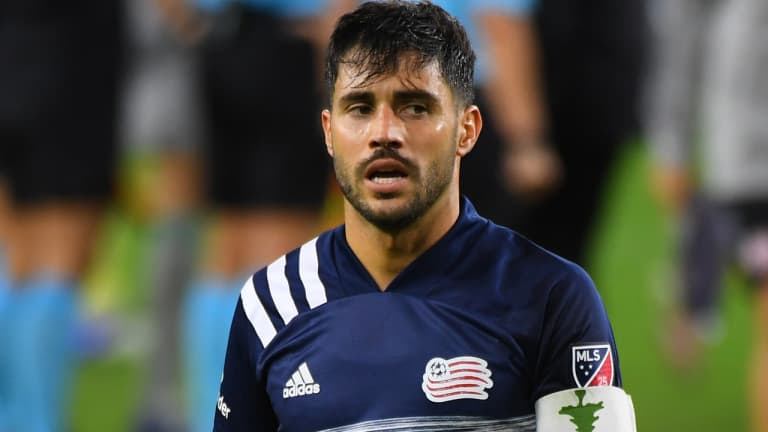
According to Brad Friedel, New England’s head coach at the time, Gil was the next name on the Revolution’s No. 10 shopping list when they unsuccessfully explored a move for Pozuelo in 2018. He would soon prove just as impactful as his compatriot.
A club-record fee brought the cerebral Spanish conductor from Deportivo la Coruna the following winter and he became instrumental in the Revs’ dramatic climb up the standings and into the playoffs after the arrival of Bruce Arena.
Expertly linking defense to attack whether central or pinching in from the flank, Gil thrived in 2019 netting 10g/14a, completing 2,109 passes (fifth-best in MLS) and topping the league charts in pass completion in the final third while also committing to the hard work of counter-pressing defensively.
MLS Newcomer of the Year honors followed and Gil fast became a symbol of the Revolution’s renewed ambition alongside his fellow top-shelf DPs Gustavo Bou and Adam Buksa. While his long-term absence due to an achilles problem blighted his 2020, Gil returned just in time to spearhead New England’s deep run in the postseason.
“My best quality is finding players in space. I think my role in this case is to put the ball in the right spaces to create dangerous opportunities for us against our opponents,” Gil told the Boston Herald last month.
“I have to possess the ball and this is a league that moves very fast from one side to the other. So we need to recollect ourselves and calm ourselves down. Bruce has played a major role in that since he got here.”
In contrast to his unassuming nature off the pitch, Gil has assertively embraced the responsibility of leadership at Gillette Stadium and is said to have vowed to teammates that hardware will be hosted in 2021.
Valeri and Blanco, Portland’s two-headed monster
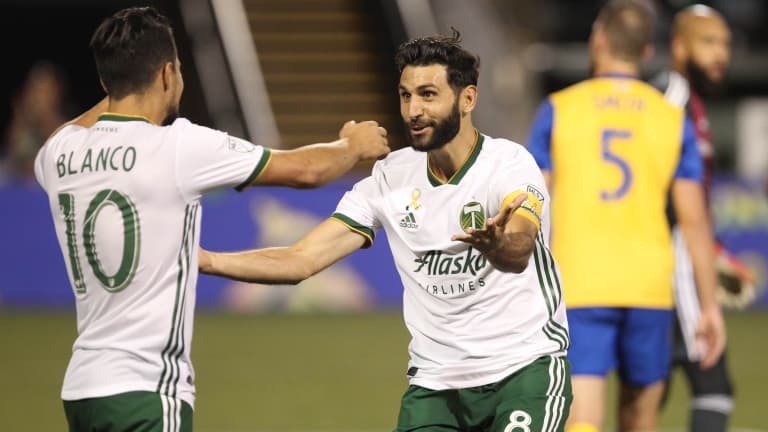
Diego Valeri was already a Portland Timbers icon when his childhood friend and old CA Lanus academy mate Sebastian Blanco arrived from San Lorenzo ahead of the 2017 MLS season. His sustained attacking excellence, wholehearted embrace of the Rose City and its culture and pivotal role in PTFC’s euphoric run to the 2015 MLS Cup title – the first major honor in the club’s history – ensured that.
Some wondered whether Blanco, a creator of a comparable profile who’s two years younger, was seen as a successor or competitor to “San Valeri.” But over the past four seasons the two men, who grew up just a few miles apart in the Buenos Aires suburbs, have vanquished such questions with devastating chemistry and ego-free service to their club.
Their versatility and tactical intelligence has allowed the duo to thrive in a variety of situations in PDX: Starting, or coming off the bench. Sitting deep and countering with deadly precision, or building proactively. Blanco can playmake centrally, out wide or even up top, most often offering rare dynamism down the channels that dovetails with Valeri’s roaming orchestration between the lines.
The Argentines share technical mastery and speed of thought, and both have shown a flair for the spectacular in big moments, pacing Portland’s run to the 2018 MLS Cup final and top honors in last summer’s MLS is Back Tournament.
“When we signed Blanco, it coincided with Valeri having the best season of his career and being MVP,” Timbers GM Gavin Wilkinson said in 2019. “Valeri was essential in us getting Blanco, and Blanco was essential in the success of Valeri.”
Having two A-list talents so happy to share the load has kept Portland in the MLS elite. Blanco’s torn ACL dealt the team a huge blow down last year’s home stretch, though he’s fast approaching a return to match play and could be ready for action when their league slate begins.


